Mette Hazenberg was appointed Professor of Internal Medicine, in particular Cell Therapy in Haematology in 2021. On Thursday 30 June 2022, she officially accepted her professorship by presenting her inaugural lecture: 'Diversity, cell therapy and the blood principle'. Her appointment is a recognition of her scientific research achievements on tumor immunology. “The strength of our research is that we use what the immune system has itself devised to combat leukemia,” says Prof. Hazenberg.
Stem cell transplants
For many people with hematological diseases, stem cell transplantation is the last resort in hopes of a long-term response. The procedure aims to 'reset' the immune system by destroying the patient’s immune system with chemotherapy and radiation, followed by the transplantation of healthy stem cells from their body or from a donor. The new immune cells can recognize and destroy remaining lymphoma cells. But in some cases, donated stem cells see non-cancerous cells as foreign and attack the patient’s healthy tissue and organs instead, a condition called graft-vs-host disease. This affects the majority of patients to some extent and can even result in death.
Alternatives to immunosuppressive therapies
Graft-versus-host disease is currently treated with immunosuppressive therapies such as steroids, which have serious side effects of their own. Prof. Hazenberg is researching alternatives to potent immunosuppressants. She sees opportunities in innate lymphoid cells (immune cells that are part of the innate defenses) and conducts research into fecal transplants – the first promising results of which were recently published. Prof. Hazenberg also studies antibodies made by B lymphocytes with potential anti-leukemia activity. “It is possible that in the future we can replace stem cell transplantation as a therapy for acute leukemia with antibody therapy, that is my aim.”
Effectiveness of SARS-Cov-2 vaccines
Another obstacle for immunocompromised leukemia patients is the risk of infections with bacteria, fungi, or viruses. In 2020, Prof. Hazenberg received funding from ZonMW to set up a study into the effectiveness of SARS-Cov-2 vaccines in patients with a blood disease and a poor immune system. “With a core team, we wrote a project proposal within 6 days. Two months later, we had included 723 patients across 4 university centers in our COBRA KAI study, and all these patients received their first vaccination within two months,” said Prof. Hazenberg.
It was generally thought that SARS-Cov-2 vaccines would not give sufficient protection for these individuals because their weakened immune systems are unable to mount an adequate response. “However, our data are showing that many of these patients responded well to vaccinations against COVID-19. Their immune systems were turning out enough antibodies for a good defense. A group of severely immunocompromised patients remains however, for whom we should continue to take care.” The COBRA KAI study is contributing to shaping SARS-Cov-2 vaccine strategies and policies for these patients.
Click here to see the inaugural lecture by Prof. Mette Hazenberg.
For more information contact Prof. Mette Hazenberg.
Adapted from the article ‘Leukemie: een ziekte met grote gevolgen voor je leven’.
Foto: Marlou Pulles

